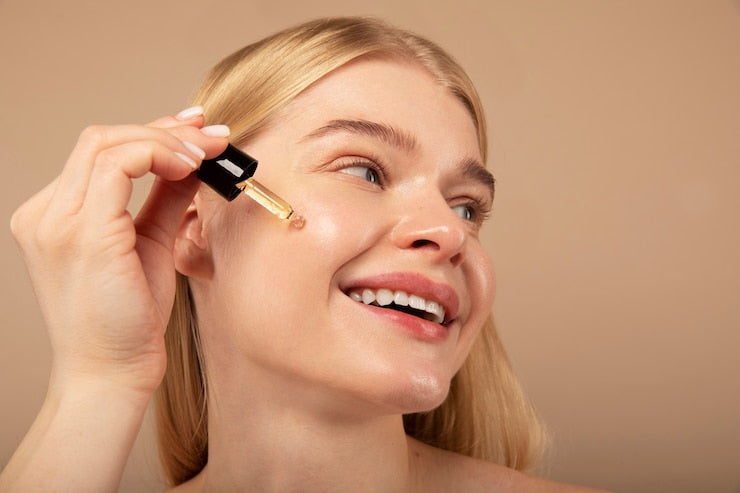
The Truth About Serums: What Your Skin Really Needs
Share
In the ever-evolving world of skincare, serums have emerged as a cornerstone for achieving radiant, healthy skin. These potent formulations, known for their high concentration of active ingredients, offer targeted solutions for various skin concerns. As consumers become more informed and discerning, understanding the true benefits and applications of serums is essential. This comprehensive guide delves into the science behind serums, their myriad benefits, and how to incorporate them effectively into your skincare regimen.
Understanding Serums
What Are Serums?
Serums are lightweight, fast-absorbing liquids designed to deliver high concentrations of active ingredients directly into the skin. Unlike moisturizers, which primarily hydrate and create a barrier on the skin's surface, serums penetrate deeper, addressing specific concerns such as wrinkles, pigmentation, and dehydration.
Types of Serums
-
Hydrating Serums: Contain ingredients like hyaluronic acid and vitamin B5 to attract and retain moisture.
-
Anti-Aging Serums: Formulated with retinol, peptides, and antioxidants to reduce fine lines and improve skin elasticity.
-
Brightening Serums: Utilize vitamin C, niacinamide, and alpha arbutin to even out skin tone and diminish dark spots.
-
Acne-Fighting Serums: Include salicylic acid and tea tree oil to unclog pores and reduce inflammation.
-
Exfoliating Serums: Feature alpha and beta hydroxy acids (AHAs and BHAs) to promote cell turnover and smooth texture.
-
Antioxidant Serums: Packed with vitamins C and E, green tea extract, and ferulic acid to combat free radicals and environmental damage.
The Science Behind Serums
Deep Penetration
Due to their low molecular weight, serums can penetrate the skin more deeply than heavier creams. This allows active ingredients to reach the dermal layers, where they can exert maximum efficacy.
High Concentration of Actives
Serums are formulated with a higher concentration of active ingredients compared to other skincare products. This potency enables them to deliver noticeable results in a shorter time frame.
Targeted Treatment
Each serum is designed to address specific skin issues, allowing for a customized skincare approach. Whether it's combating signs of aging or reducing acne, there's a serum tailored for every concern.
Benefits of Incorporating Serums into Your Skincare Routine
1. Enhanced Hydration
Hydrating serums, especially those containing hyaluronic acid, draw moisture into the skin, resulting in a plump and youthful appearance. This is particularly beneficial for individuals with dry or dehydrated skin.
2. Improved Skin Texture and Tone
Regular use of serums with exfoliating agents like AHAs and BHAs can lead to smoother skin texture and a more even complexion. These ingredients promote the shedding of dead skin cells, revealing fresher skin underneath.
3. Reduction of Fine Lines and Wrinkles
Anti-aging serums containing retinol and peptides stimulate collagen production, which helps in reducing the appearance of fine lines and wrinkles over time.
4. Brightening Effect
Serums with vitamin C and niacinamide can fade hyperpigmentation and dark spots, leading to a brighter and more radiant complexion.
5. Acne Control
For those prone to breakouts, serums with salicylic acid and tea tree oil can help unclog pores, reduce inflammation, and prevent future acne flare-ups.
6. Protection Against Environmental Damage
Antioxidant-rich serums defend the skin against environmental aggressors like pollution and UV rays, which can accelerate aging and cause damage.
How to Choose the Right Serum for Your Skin Type
For Dry Skin
Opt for hydrating serums with hyaluronic acid, glycerin, and ceramides to replenish moisture levels.
For Oily or Acne-Prone Skin
Look for lightweight, non-comedogenic serums containing salicylic acid, niacinamide, or tea tree oil to control oil production and prevent breakouts.
For Sensitive Skin
Choose serums with soothing ingredients like chamomile, aloe vera, and calendula. Avoid products with alcohol or strong fragrances.
For Mature Skin
Select anti-aging serums with retinol, peptides, and antioxidants to address wrinkles and loss of elasticity.
For Uneven Skin Tone
Brightening serums with vitamin C, alpha arbutin, and licorice extract can help even out pigmentation and enhance radiance.
Incorporating Serums into Your Skincare Routine
-
Cleanse: Start with a gentle cleanser to remove dirt and impurities.
-
Tone: Apply a toner to balance the skin's pH and prepare it for serum application.
-
Apply Serum: Dispense a few drops of serum onto your fingertips and gently press it into the skin, focusing on problem areas.
-
Moisturize: Follow up with a moisturizer to lock in the serum and provide additional hydration.
-
Sun Protection: In the morning, finish with a broad-spectrum sunscreen to protect your skin from UV damage.
Common Misconceptions About Serums
"Serums Are Only for Aging Skin"
While many serums target signs of aging, there are formulations designed for various concerns, including acne, dehydration, and pigmentation.
"More Product Equals Better Results"
Using more serum than recommended doesn't enhance its effectiveness and can lead to irritation. A few drops are typically sufficient
"Serums Replace Moisturizers"
Serums and moisturizers serve different purposes. While serums deliver active ingredients, moisturizers hydrate and create a protective barrier.
The Future of Serums
The skincare industry continues to innovate, introducing serums with cutting-edge ingredients like growth factors, stem cells, and novel peptides. These advancements aim to provide more effective and targeted treatments for a range of skin concerns.
Conclusion
Serums are a powerful addition to any skincare routine, offering targeted solutions for a variety of skin issues. By understanding their functions and selecting the right formulation for your skin type, you can achieve noticeable improvements in texture, tone, and overall skin health. As with any skincare product, consistency and proper application are key to reaping the full benefits.
